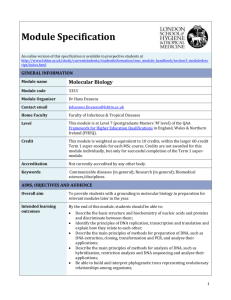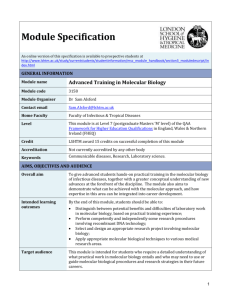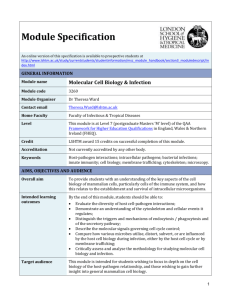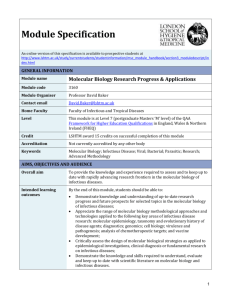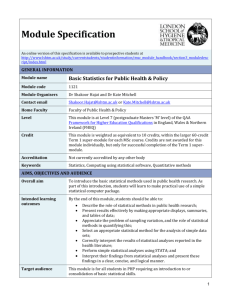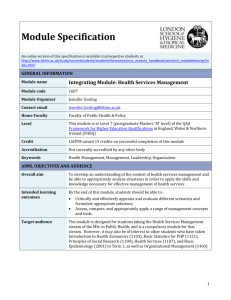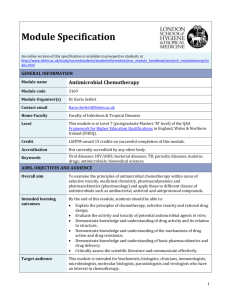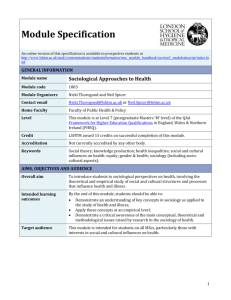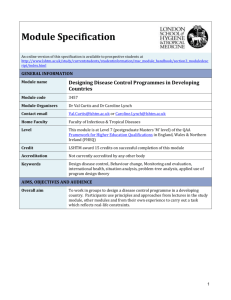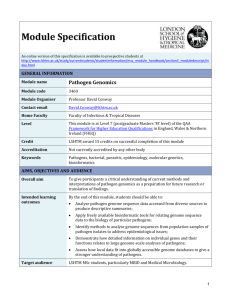3131 Molecular Biology & Recombinant DNA Techniques Module
advertisement
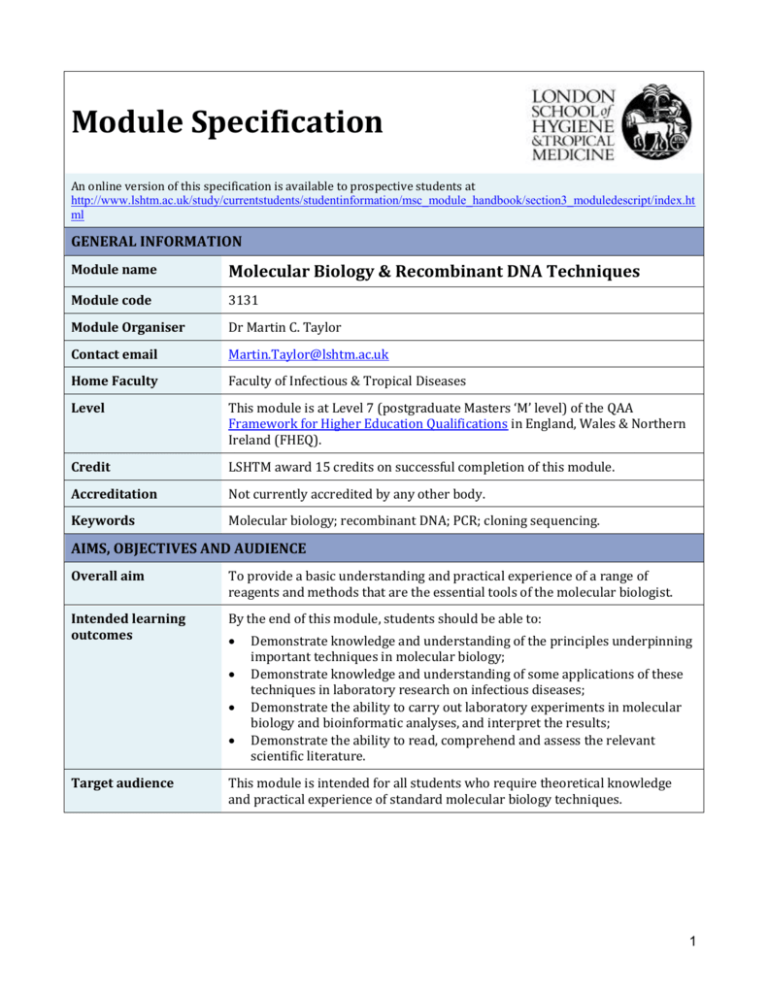
Module Specification An online version of this specification is available to prospective students at http://www.lshtm.ac.uk/study/currentstudents/studentinformation/msc_module_handbook/section3_moduledescript/index.ht ml GENERAL INFORMATION Module name Molecular Biology & Recombinant DNA Techniques Module code 3131 Module Organiser Dr Martin C. Taylor Contact email Martin.Taylor@lshtm.ac.uk Home Faculty Faculty of Infectious & Tropical Diseases Level This module is at Level 7 (postgraduate Masters ‘M’ level) of the QAA Framework for Higher Education Qualifications in England, Wales & Northern Ireland (FHEQ). Credit LSHTM award 15 credits on successful completion of this module. Accreditation Not currently accredited by any other body. Keywords Molecular biology; recombinant DNA; PCR; cloning sequencing. AIMS, OBJECTIVES AND AUDIENCE Overall aim To provide a basic understanding and practical experience of a range of reagents and methods that are the essential tools of the molecular biologist. Intended learning outcomes By the end of this module, students should be able to: Target audience Demonstrate knowledge and understanding of the principles underpinning important techniques in molecular biology; Demonstrate knowledge and understanding of some applications of these techniques in laboratory research on infectious diseases; Demonstrate the ability to carry out laboratory experiments in molecular biology and bioinformatic analyses, and interpret the results; Demonstrate the ability to read, comprehend and assess the relevant scientific literature. This module is intended for all students who require theoretical knowledge and practical experience of standard molecular biology techniques. 1 CONTENT Session content The module is expected to include sessions addressing the following topics (though please note that these may be subject to change): PCR; DNA cloning; Bacterial transformation; Plasmid DNA purification; Restriction digestion analysis of DNA; DNA sequencing; Sequence analysis. TEACHING, LEARNING AND ASSESSMENT Study resources provided or required Lecture notes and journal article examples will be provided. Students should have access to a basic molecular biology text such as “Gene cloning and DNA analysis” by T.A. Brown (Blackwell). Teaching and learning methods A range of teaching methods will be used including laboratory practicals, formal lectures and group work. Approximately 40% of contact time is devoted to practicals, 20% to lectures, and the remainder to group work and revision sessions. Much of the practical and lecture teaching will be done by the Module Organiser to ensure coherence. There also will be several full and half days set aside for private study. Assessment details There will be two components to the assessment: 1. Practical results (including bioinformatic analyses) will be written up and assessed to evaluate understanding of the practical portion. 2. A short answer written test will be held at the end of the module to evaluate literature comprehension. The grades for each component will be equally weighted and combined to give an overall GPA; written feedback is given on both. Self assessment questions also accompany some lectures with the answers being discussed in the following class. For students who are required to re-sit, or granted a deferral or new attempt, the tasks will be an exam based on lecture content from the module and a journal article comprehension exam Assessment dates Assessments will take place on a date TBC For students who are required to re-sit, or who are granted a deferral or new attempt, the next assessment date/deadline will be the standard Schoolrecommended date in mid/late September 2015. Language of study and assessment English (please see ‘English language requirements’ below regarding the standard required for entry). 2 TIMING AND MODE OF STUDY Duration The module runs for 5 weeks at 2.5 days per week; this module runs between Monday morning and Wednesday lunchtime. Dates For 2015-16, the module will start on Monday 11 January 2016 and finish on Wednesday 10 February 2016. Timetable slot The module runs in LSHTM timetable slot C1. Mode of Study The module is taught face-to-face in London. Both full-time and part-time students follow the same schedule. For full-time students, other LSHTM modules are available in the other half of the week for the C and D slots. Learning time The notional learning time for the module totals 150 hours, consisting of: Contact time ≈ 35 hours Directed self-study ≈ 10 hours Self-directed learning ≈ 51.5 hours Assessment, review and revision ≈ 53.5 hours. APPLICATION, ADMISSION AND FEES Pre-requisites It is expected that all students will have obtained a basic understanding of nucleic acids, gene expression and protein synthesis from having completed the formative assessment for the term 1 module Molecular Biology (3333), which is a prerequisite. This module’s content is coordinated with ‘Advanced Training in Molecular Biology’ (3158). English language requirements A strong command of the English language is necessary to benefit from studying the module. Applicants whose first language is not English or whose prior university studies have not been conducted wholly in English must fulfil LSHTM’s English language requirements, with an acceptable score in an approved test taken in the two years prior to entry. Applicants may be asked to take a test even if the standard conditions have been met. Student numbers Student numbers are typically [20-30] per year; numbers may be capped due to limitations in facilities or staffing. Student selection Preference will be given to LSHTM MSc students [particularly those registered for specific courses or who have taken specific prior modules, where applicable] and LSHTM research degree students. Other applicants meeting the entry criteria will usually be offered a place in the order applications are received, until any cap on numbers is reached. Applicants may be placed on a waiting list and given priority the next time the module is run. Full Registration (full participation) by LSHTM research degree students is required for this module, although the assessment for research degrees students is optional. 3 Fees For registered LSHTM MSc students, fees for the module are included within MSc fees (given on individual course prospectus pages). If registering specifically for this module, as a stand-alone short course, individual module fees will apply. Tuition fees must be paid in full before commencing the module, or by any fee deadline set by the Registry. Scholarships Scholarships are not available for individual modules. Some potential sources of funding are detailed on the LSHTM website. Admission deadlines For 2015-16: For registered LSHTM MSc students, the module choice deadline (for Term 2 and 3 modules) is Friday 20 November 2015. If registering specifically for this module, applications may be made at any time but, as places are limited, early application is recommended. All applications should be submitted by, at the latest, 8 weeks prior to the start of the module. Formal registration will take place on the morning of the first day of the module. ABOUT THIS DOCUMENT This module specification applies for the academic year 2015-16 Last revised 22 May 2015 by Martin Taylor London School of Hygiene & Tropical Medicine, Keppel St., London WC1E 7HT. www.lshtm.ac.uk 4
